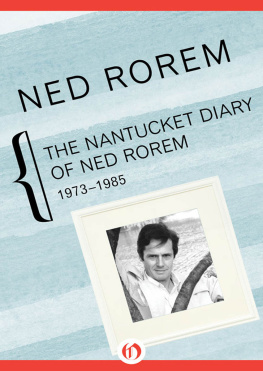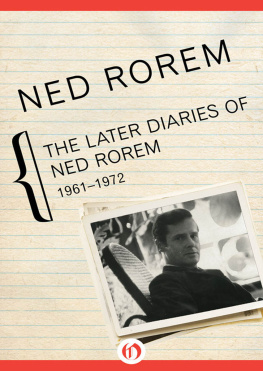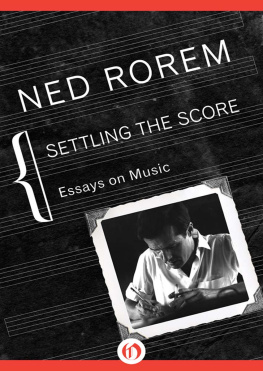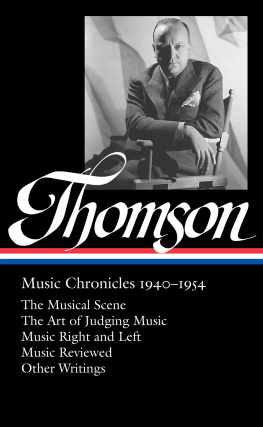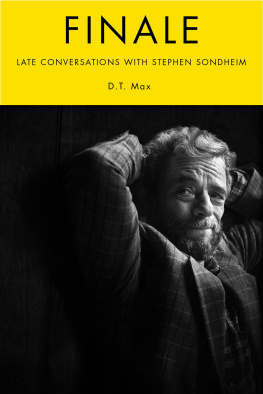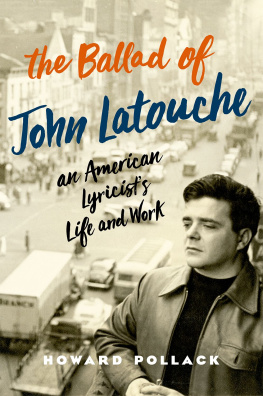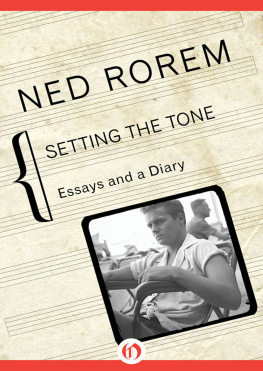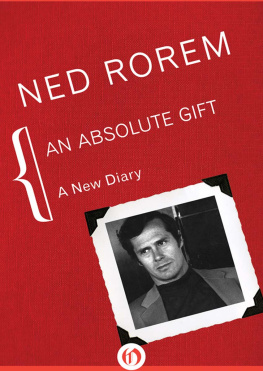THE
Nantucket Diary
OF
Ned Rorem
1973-1985

1973

New York, New Years Afternoon
This morning while puttering with the crossword (which I seldom try, being slow at it, and never quite getting the point) I fell upon my own name. Composer Rorem was the clue. Instantly I filled in three squares with my given label. My immediate reaction was one of relief, since this was virtually the only answer I had found. The second reaction was of embarrassment that most people would complete the puzzle except for those three blanks. Finally I felt annoyed. Who am I to be thus immortalized when I havent done a lick of work all week! I rushed to the piano and began practicing scales.
Someone at the Times loves me. Every six or eight months for the past several years Ive been featured in either the daily or Sunday puzzle. JH says its only because my Christian name, like Ava or Ari, is convenient for those short leftover slots.
The pattern of the linoleum on the bathroom floor here resembles welts from bedbug bites. Distant but nagging toothache, or gumache, again. For fifteen years the area of the right eyetooth has been exquisitely sensitive. Worry, worry.
Ice-cold Della Robbia weather showers us with sunlight.
4 January
To Steinways basement for first rehearsal of Night Music with Ann Schein and Earl Carlyss, my ugliest piece, and very effective, at least as they played it. An hour earlier, visit to Dr. Schreiber (Mothers proctologist) for the aches of twenty years, aches that fade at the violins sound.
Madison Hotel
Washington, D.C.
13 January
Shuttled here last night with the Popes and dined with Paul Callaway. Premiere at Library of Night Music. The first movement, Answers, was no sooner intoned than a female voice, audible and cross, rose from the audience: What are the questions? Recorded this morning for Desto.
Later. New York. Dietrich on TV in Dishonored, her most perverse, surrealist, nervy film. She is forever more equivocal than Garbo.
24 January
Parties, concert, work, parties. Then yesterday, visit to Hurok offices, later to Tully Hall with Shirley for Elliott Carters new quartet which we couldnt make anything of, but which got a standing ovation.
Visit to Dr. S., and Dubuffets tacky sculpture in Chase Manhattan Plaza. Death of Marius Bewly.
28 January
JHs Chapel Concert of Satie and Britten, including his arrangement for organ of La Messe des pauvres. Landowska, when asked, Whos the best after you? answered, Denise Restout, of course. I reply to that question, Jim Holmes, of course.
Sans date
Our cousins, Chester Ronning and his daughter Audrey Topping, came with my parents to dine. (Famous spiced chicken, plus Grimbles cheesecake with a hot strawberry sauce.) Chester and my father, both seventy-seven, look fifty-nine, and suave Audrey in white leather, blondined and booted, hardly seemed smack out of Communist territories. But both, though Norwegian capitalists, are Chinese linguists and, by now, cool and collected with interviewers. After supper Eugene Istomin came over with John Trapp, and we took family pictures.
Chester, when asked no doubt for the millionth time what humor is like in China, replies its like anywhere else, and illustrates with a joke: A henpecked husband, fed up, exclaims, Ill die before I let her get away with this anymore, whereupon he drops dead. Now thats not funny in itself, nor hardly just Chinese, the figurative-as-literal being one of the four basic devices of all times.
But there is rich-people wit and poor-people wit, French humor and Jewish humor. People are different, with their ethnic and national fun, primitive and sophisticated fun. Humor is not exemplified in The Funny Story, since there are too many ways to relate that same plot. Humor is tone based on irony, a Janus head. Children, being literal-minded, have no humor. Which doesnt mean theyre pedestrian: they literally see a blue elephant flying, a candy house, Santa Claus. Humor will come to them with disillusionment. By this definition the Chinese peasant probably lacks humor since he lacks training in the nuance of contrastat least in our nuance of contrast.
French: brevity. Jokes about cuckolds.
German: drawn out (German jokes are no laughing matter). About food and scatology.
American: sex.
Did Handel have humor? His musics too removed to assess in perspective. Perhaps he was not even great. How long does greatness last?
What is musical humor? How wearying to hear forever about Haydns wit. Play him with a movie on childbirth (as Cocteau played Bach for a suicide) and youll hear how witty he is.
If Chopins tunes were better (funnier) than Beethovens, was he greater than Beethoven?
Have I said all this better elsewhere?
All great art contains humor. Insofar as Beethoven lacked humor he lacked greatness. Children and the insane lack the irony of humor. Ironically, the great are sometimes called grown-up children. They are not. They are like everyone else only more solike everyone else, but no one is like them.
Humor means seeing three sides of one coin.
Hall Overtons Huckleberry Finn failed utterly and for the same reason as my Miss Julie, these operas being two sides of one coin. Both composers miscalculated their language: Overton chose chromatic speech for an essentially uncomplicated exterior situation, while my speech was diatonic for a complex inner situation.
Dodecaphonism, inherently tense, has built in too many humorless Luluesque associations to be usable for a Mark Twain book despite its updating to center on Nigger Jim, while diatonicism, inherently relaxed, is incapable of illustrating madness, at least current madness (and Strindberg is more current than Twain). In theater style is all. Even calculated misplacements are risky.
Thus neither Overton nor I by nature of our language could translate the subject matter. Had we traded librettos we might have hit the jackpot.
Fakery in opera is more discernible than in other modern musics modes. Being so slippery in so many ways, particularly in reliance on words, opera cannot depend on rhetoric rather than on expressivity. Opera must depend on expressivity. It is hard to imagine one by Stockhausen, since he depends on philosophy, on extramusicality.
Yaddo
11 February
Mostly reading Willa Cather in the warm ease of the Pink Room, while out there lurks the sub-zero weather. But Alvin Ross is here too, pacifying and clever, and doing a still life of a marble cake the model for which, after a week, has, thanks to preservatives, turned hard as marble.

